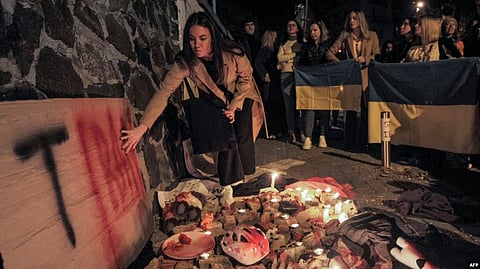Russia has likely depleted its supply of Iranian one-way-attack uncrewed aerial vehicles or OWA-UAVs, the British Defense Ministry said Saturday in an intelligence update.
The ministry said there have not been any reports of the vehicles being used in Ukraine “since around” Feb. 15, while at least 24 were reported downed between late January and early February.
“Scores were destroyed in the first few days of the year,” the ministry said.
The British ministry said Ukraine will likely seek more stock of the unmanned vehicles, despite their bad track record for destroying their intended targets.
“Russia likely sees them as useful decoys which can divert Ukrainian air defenses from more effective Russian cruise missiles,” according to the ministry’s report.
Ukrainian President Volodymyr Zelenskyy said Friday Russia’s killing of so many people in Ukraine cannot go unpunished. He said he wants the Russian military and political leadership brought before the International Criminal Court.
“They must be held responsible,” Zelenskyy said. “I believe in accountability.”
On Friday, a year after Russia began its invasion of Ukraine, the White House announced that the Pentagon would commit $2 billion more in military assistance to Ukraine’s defense against Russia.
The package includes additional ammunition for HIMARS, or High Mobility Artillery Rocket System, 155 mm artillery rounds, munitions for laser-guided rocket systems, and funding for training, maintenance, and sustainment of equipment. President Joe Biden reasserted his vow that "Ukraine will never be a victory for Russia."
Secretary of State Antony Blinken reaffirmed the U.S. commitment to support Ukraine’s infrastructure. Blinken said the State Department in coordination with the U.S. Agency for International Development and the Treasury Department are offering $10 billion in assistance, including budgetary support to Ukraine and additional energy assistance to support Ukrainians suffering from Russia’s attacks.
The State Department also marked the first anniversary of Russia's invasion of Ukraine on Friday by sanctioning more than 60 top Russian officials, including Cabinet ministers and regional leaders, and three enterprises that run the country's nuclear weapons program.
Additionally, the U.S. announced broader global sanctions against companies for helping Moscow evade export restrictions and access key technologies.
The Treasury Department said it is sanctioning Russia’s metals and mining sector among others. The action, taken in coordination with the G-7 leading industrial nations, seeks to punish 250 people and firms, puts financial blocks on banks, arms dealers and technology companies tied to weapons production, and goes after alleged sanctions evaders in countries from the United Arab Emirates to Switzerland.
“Our sanctions have had both short-term and long-term impact, seen acutely in Russia’s struggle to replenish its weapons and in its isolated economy,” Treasury Secretary Janet Yellen said.
(SJ/VOA)


